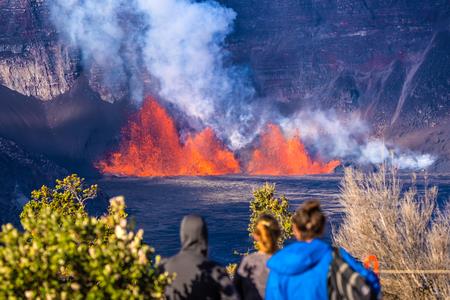Good info!
Sent from my Verizon, Samsung Galaxy smartphone
Amongst many other considerations, Mia Monroe reminds us of the economic benefit that accrues to our communities from our National Parks.
Local economies in every state boosted by national park visitor spending

Visitors watch an eruption on December 23, 2024, from an overlook northwest of Keanakākoʻi Crater at Hawaiʻi Volcanoes National Park.
News Release Date: September 25, 2025
Contact: newsmedia@nps.gov
WASHINGTON, D.C. - The National Park Service released a new report finding visitor spending in communities near national parks in 2024 resulted in a $56.3 billion benefit to the nation’s economy. Spending by national park visitors contributes to local, regional and U.S. economies, supporting a vibrant tourism industry in gateway communities.
“National parks deliver a clear economic return—supporting communities, driving tourism, and strengthening local economies in every state,” said Acting Assistant Secretary for Fish and Wildlife, and Parks Kevin J. Lilly. “As we approach the 250th anniversary of American independence in 2026, I encourage all Americans to reflect on our history and honor those who shaped it. Every visit to a park not only deepens that connection but also helps sustain the communities and economy that benefit from these treasured places.”
The National Park Service report, 2024 National Park Visitor Spending Effects, finds that visitors spent $29 billion in communities near national parks. This spending provided $18.8 billion in labor income and $56.3 in economic output to the U.S. economy. The lodging sector had the highest direct contributions with $11.1 billion in economic output.
Restaurants received the next greatest direct contributions with $5.7 billion in economic output.
“Our parks are making a meaningful difference in local communities,” said Jessica Bowron, Comptroller, Exercising the Delegated Authority of the Director, National Park Service.
“These communities are essential partners in creating memorable visitor experiences, advancing conservation goals, and strengthening the economic health of areas surrounding public lands.”
The latest report is informed by updated economic data and new socioeconomic survey data enhancing the accuracy of economic estimates. Changes in economic estimates are due to the increase in visits, inflation, improved spending profiles for 12 parks, and the update to the economic data.
Results from the visitor spending effects report series are available online via an interactive tool. Users can view year-by-year trend data and explore current year visitor spending, labor income, value-added, and economic output effects by sector for national, state and local economies.
The annual peer-reviewed economics report was prepared by economists from the National Park Service. Learn more about how NPS-managed lands and programs provide economic benefits at nps.gov.
National Park Visitor Spending Contributed $56 Billion to the U.S. Economy in 2024
Greg